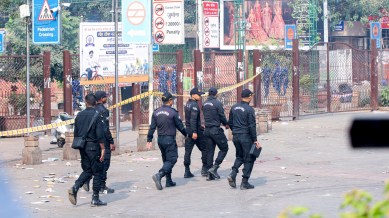Stay updated with the latest - Click here to follow us on Instagram
Red fort car explosion: Shops where raw materials bought identified, owners being questioned
Not just ammonium nitrate, potash too was sourced, say investigators

Investigators probing the Red Fort car explosion have identified the shops from where raw materials used for the explosives were procured. Sources said these shops are located across Palwal, Gurgaon and Faridabad.
Sources said this will help the probe teams ascertain how the explosives were made, who supplied the materials, and whether the suppliers had any links, direct or indirect, with the blast perpetrators.
While some shop owners have been detained for questioning, others are being rounded up, sources told The Indian Express. The procurement, sources said, took place over a period of time.
Around 300 kg of fertilisers was purchased by suspects linked to the Faridabad terror module from a shop in Nuh’s Pinangwan village, located about 60 km from the Al Falah University campus in Faridabad.
On Wednesday evening, police reached the shop and questioned its owner, Dinesh Aggarwal, alias Dabbu, who lives with his family on the first and second floors of the building; the shop is on the ground floor. Dabbu was later taken in for questioning by investigation agencies.
Sources said one of the accused, Muzammil Ahmad Ganai, and other suspects bought urea from the shop a few months ago. “It is suspected that they took it to Al Falah University, where they mixed it with other chemicals to make an explosive,” a police officer said.
Around five-seven persons who had been in contact with Muzammil and Umar Nabi, who was driving the i20 car that exploded near the Red Fort, at the university are also being questioned.
While the stockpiling of ammonium nitrate has been the focus of the probe, investigators have found that the accused doctors had been simultaneously sourcing potash (potassium chloride) from shops that sell fertilisers and pesticides in the vicinity of Dhauj village and neighbouring areas of Nuh.
Investigators said a mixture of the two can create a potent and unstable explosive, which would have been in line with the “bigger” attacks they were planning before the module was busted.
“Potassium chloride destabilises ammonium nitrate and lowers the temperature at which it decomposes. While ammonium nitrate alone is an oxidiser, it becomes an explosive when mixed with other components such as fuel, and its stability is worsened by contaminants like potassium chloride, especially under certain conditions like high temperatures or confinement. We can say that the reaction between these two compounds can become self-accelerating, leading to a rapid increase in heat and pressure that can trigger a detonation,” said an investigator involved in the probe.
“It is learnt that the accused transported the potash and ammonium nitrate in two vehicles: the i20 used in the Red Fort blast, and a Ford EcoSport which belonged to Umar and was recovered in Faridabad Wednesday evening,” the source said.
According to the source, when Haryana police were investigating the source of the ammonium nitrate, they identified and detained a few fertiliser and pesticide dealers, who disclosed that the accused had been gathering potash too.
“Potash is sold by several dealers across Faridabad and Nuh. One 50 kg bag costs around Rs 1,000-1,400, depending on the quality of the granules, and it is also available online through wholesale dealers. We are still investigating how these accused procured it all,” a source said. “Potash is available off the shelf easily and can be bought without raising an eyebrow. It is generally sprayed on vegetable crops.”
Sources said that the approximately 2,900 kg of suspected explosive material recovered during the raids on premises linked to the accused includes ammonium nitrate, potash, phosphorus, reagents, inflammable material, electronic circuits, batteries, wires, remote controls, timers and metal sheets.